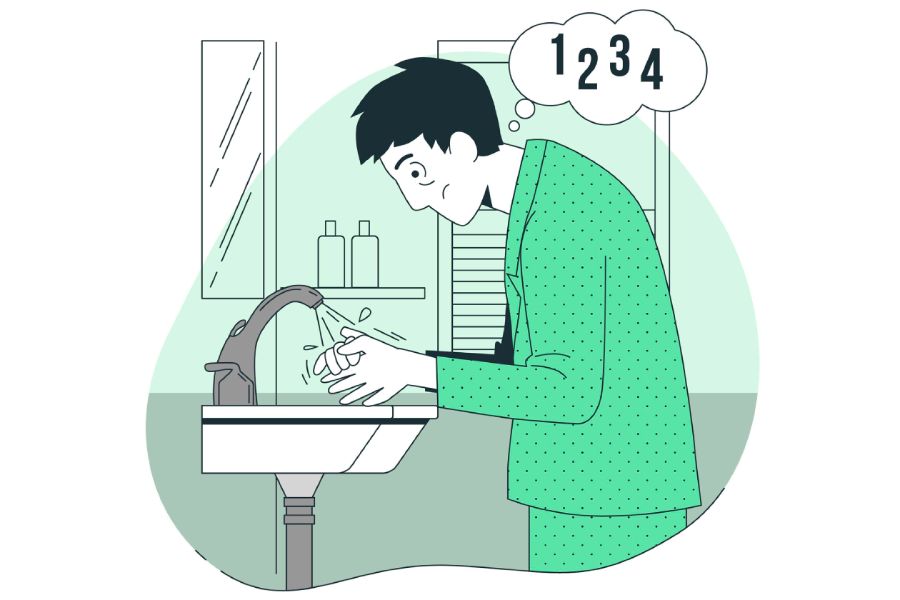What is OCD?
Obsessive Compulsive Disorder (OCD) is a chronic (lifelong) mental health condition which is characterized by two main components – obsessions and compulsions.
This condition features a pattern of unwanted and recurring thoughts, ideas, impulses, doubts, or sensations, which are experienced to be repugnant, uncontrollable and guilt-provoking. These thoughts tend to be persistent and intrusive in nature, and the behaviour patterns that stem from these thoughts are stubborn – meaning they are resistant to change. (Rachman & Hodgson, 1980).
These obsessions are subjectively resisted, meaning that they are often accompanied by the sense that they “need to be dealt with”, avoided, or neutralized. Thus, one might understand that these obsessive thoughts aren’t true, or that the compulsions won’t do anything to prevent the thoughts, however, they often feel uncontrollable, and the individual fears that if an action isn’t taken, some disastrous consequences will occur (Jacoby, 2014).
As a result, obsessions and/or compulsions can take up a great amount of an individual’s time, and lead to an interference in their everyday life (Goodman, 1999).
In this Blog, we will be discussing the following points
- Difference between obsessions and compulsions.
- Signs of OCD.
- Causes of OCD.
- Impact of OCD in daily life.
- Treatment.
Obsessions vs. Compulsions
As mentioned before, obsessions and compulsions are the two distinct components of OCD.
Obsessions
The first element of this disorder – obsessions – are characterized by an individual being occupied or preoccupied with certain thoughts or ideas which are generally intrusive and distressing. These thoughts may repeatedly enter an individual’s mind, and can lead to anxiety or significant discomfort. Many people with OCD recognize that these persistent thoughts are extreme and irrational, however, the distress that is caused by these thoughts cannot be resolved through logic.
Although they may vary with individuals, the general themes of obsessions are usually related to contamination, the responsibility or failing to prevent harm to oneself or others, uncertainty, “taboo” topics (such as sex, blasphemy, violence, and other socially unaccepted subjects), and the need for order and symmetry (Jacoby, 2014).
Some examples of obsessions are
- Contamination Obsessions: The fear of being contaminated by other people, or one’s own environment.
- Symmetry or Orderliness Obsessions: Extreme concern with order, symmetry, and precision, and for things to be done in a specific manner.
- Harm Obsessions: Intrusive thoughts of causing harm to oneself and/or others, either accidentally or intentionally.
- Health Obsessions: Preoccupation with one’s physical health, and repeated thoughts about having a serious health condition.
- Taboo Obsessions: Thoughts of blasphemy, and disturbing sexual or socially unacceptable thoughts or images that go against an individual’s and society’s values.
- Doubt Obsessions: Constant doubt and uncertainty related to everyday actions.

Compulsions
An individual may attempt to ignore or suppress the anxiety created from obsessive thoughts by performing certain, repetitive actions (Gava, Barbui, Aguglia, et al, 2007). These repetitive behaviours – compulsions – can all interfere with an individual’s daily life.
Not performing these behaviours often creates great amounts of distress that is commonly attached to a specific fear or consequence if the behaviour isn’t completed. The individual suffering from OCD perceives that they’ve lost control of themselves and their actions, and often feel forced to be occupied with the compulsions despite fruitless efforts not to be (Denys, 2011).
Some examples of compulsions are
- Cleaning: Excessive hand washing, showering, brushing teeth, and/or constant cleaning, and dusting their environment.
- Checking: Repeatedly checking to confirm if they’ve locked doors properly, if they’ve switched off appliances, if they are carrying their keys with them, etc.
- Repeating: Repeating a phrase or action a certain number of times to feel a sense of “rightness”.
- Ordering or Arranging: Arranging items in a particular order or sequence that feels “right”.
- Counting: Engaging in counting rituals where an individual might count to a certain number, to an action a certain number of times, avoid certain numbers altogether, etc.
- Seeking reassurance: People with OCD may repeatedly seek validation, approval or reassurance to ease their doubts and fears related to obsessions.

Signs of OCD
Oftentimes we hear people say, “I’m so OCD,” solely because they prefer for their environment to be clean and organized. However, it is important to understand that OCD is a serious, chronic condition that may disrupt a person’s daily activities, and create a great amount of distress in their lives.
Let’s take a look at some of the signs of OCD
According to the DSM-5 (Diagnostic and Stastistical Manual of Mental Disorders, 2013), OCD primarily involves two types of symptoms – obsessions, and compulsions. Usually both of these symptoms are present together, however, it is possible that a person only experiences obsessive symptoms, or that they only experience compulsive symptoms.
Examples of signs of obsessions
- Fear of being contaminated by objects other people have touched.
- Feeling stressed and being unable to leave the house until things are arranged in a specific manner.
- Having thoughts of harming oneself or others.
- Imagining explicit, sexual, violent, or inappropriate scenarios.
- Requiring constant reassurance from others that you are doing the right thing.
(Hooley, Butcher, Nock, Mineka, 2017)
Examples of signs of compulsions
- Excessive hand washing, or taking a shower multiple times a day for long durations to feel clean.
- Excessive checking to make sure all the doors are locked and all appliances are switched off before leaving the house.
- Needing to repeat performing a task a certain amount of times before moving on to the next task.
- Needing to count or repeat a certain word or phrase a certain amount of times.
- Needing to perform tasks in a certain order, requiring the kitchen to be arranged in a specific way, eating foods in a particular order, etc.
(Hooley, Butcher, Nock, Mineka, 2017)
Causes of OCD
The exact cause of OCD is unknown, however new research is throwing light on some evidence that points to why OCD occurs (Gavin, 2018).
(Norman, Taylor, Liu, et al, 2018) conducted a study that identified specific areas of the brain and the processes associated with the repeated behaviours of those with OCD. This study included the brain scans of hundreds of people with OCD, and compared them with those of people who didn’t have OCD.
The research findings revealed structural and functional differences in nerve circuits of those with OCD, and important processes such as error processing and inhibitory control were found to be altered in their brain scans. The brains of those having OCD were unable to use normal stop signals to quit performing the compulsive acts, although they were aware that they should stop – meaning they were unable to adjust their behaviours according to their needs (Stein, 2002).
Some other causes of OCD other than brain structure and function are
- Genetics: OCD is often inherited, and having a parent, family member, or sibling with OCD increases one’s likelihood of developing the disorder.
- Stressful Life events: Going through traumatic or stressful events may trigger the onset of OCD.
- Personality traits: Certain personality traits such as perfectionism, a need for control, high levels of responsibility, etc. can all increase the chances of developing OCD.
- Observational Learning: Obsessive and compulsive behaviours can be learned through observing the behaviours of family members.
- Comorbidities: Many people having OCD also have other mental health conditions such as anxiety, depression, Attention-Deficit Hyperactivity Disorder (ADHD), Tourette syndrome, eating disorders, etc.
(Hooley, Butcher, Nock, Mineka, 2017)
Impact of OCD in Daily Life
OCD can have a significant impact on a person’s life, and individuals dealing with OCD may experience a number of detrimental effects due to their condition (Gluck & Croft, 2022). Some possible impacts of living with OCD are:
- Isolation: Obsessions and compulsions can take up a great amount of time in a person’s day, which can interfere with their tasks and activities. Both, the pressure to complete the compulsive rituals, as well as the exhaustion that stems from them can make it difficult for a person to interact with others in social situations which may lead to individuals isolating themselves from social events altogether.
- Low Self Esteem: The longer someone deals with OCD without getting proper help, the more powerless and out of control it can make them feel. This can result in a reduced self-esteem.
- Emotional Distress: The constant cycle of obsessions and compulsions can lead to emotional distress such as anxiety, guilt, shame, etc. This impacts their overall mental well-being.
- Strain on Relationships: The behaviours that are associated with OCD may be difficult for family members and loved ones to understand, and it may often lead to frustration. Some family members might blame the person suffering with OCD for their behaviours, assuming that the person is choosing to behave that way, when in reality the person has little to no control on their compulsions.
- Impact on Physical Health
- The emotional distress caused by OCD can result in physical symptoms such as fatigue, headaches, difficulty sleeping, etc.
- A long term effect of the exhaustion and the pressure that comes from performing the compulsions may also lead to the development of heart disease, and ulcers.
- Depending on the compulsions, an individual may experience physical symptoms accordingly. For example, for someone whose ritual involves washing their hands a great amount of times per day, might have a higher risk of developing skin lesions.
(Gluck & Croft, 2022).
Treatment
In many instances the identification of OCD is delayed – sometimes because the symptoms go unrecognized, and other times because the individual keeps the obsessive thoughts a secret. However, early identification and prompt treatment is very important, and it may result in a significant improvement in symptoms and overall quality of life (Stein, 2002).
Once an OCD diagnosis has been made by a psychologist in India, it is of utmost importance to provide the patient and their families with information and support. They should be educated about the chronic nature of the disorder, how it can have an impact on their everyday life, and the importance of self management skills (Frenske & Peterson, 2015).
Common treatments for OCD
OCD is usually treated with a combination of psychopharmacology and psychotherapy. Some common psychotherapy treatments include
- Exposure and Response Prevention (ERP): The aim of exposure and response prevention is to help people break the vicious cycle of obsession and compulsions, and help improve their overall quality of life. This therapy begins by helping people confront the situations that create anxiety. Through repeated exposure, the intensity of the anxious feelings associated with the situation gradually reduces. The exposure starts off with situations that create mild levels of anxiety, and gradually moves up towards more intense situations.
- Cognitive Behavioural Therapy (CBT): Cognitive behaviour therapy includes parts of ERP, as well as focuses on cognitive distortions and other difficult behaviours that are a part of OCD. CBT helps individuals address the challenging cognitive thoughts along with the behavioural aspects of the disorder.
- Motivational Interviewing: Motivational Interviewing is a brief, client-centered, intervention technique, where the primary aim is to strengthen a person’s motivation and commitment to change.
(Frenske & Peterson, 2015)
One can seek the help from an online psychiatrist in India to diagnose the OCD problems in the initial stage and to receive personalized counseling and treatment to manage and alleviate symptoms effectively.
Conclusion
Overall, it’s evident that obsessive-compulsive disorder is much more than just wanting things to be clean or organized. It is a serious disorder that impacts the person’s quality of life. So in conclusion, let’s vow to be more mindful of throwing around terms like “ocd” and be more aware of how this may spread misinformation!

